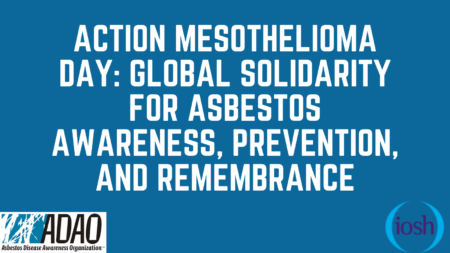Published June 30, 2021
Mavis Nye’s Blog
As a mesothelioma widow, I’ve learned the chilling and painful facts about the man-made USA asbestos disaster the hard way. But I’m not alone.
No matter where you are in the world, asbestos kills. It claims more than 200,000 lives a year worldwide, according to the Global Health Data Exchange. These deaths are entirely preventable — if there is no exposure, there is no disease. However, asbestos remains legal and lethal worldwide, including in the United States.
according to the Global Health Data Exchange. These deaths are entirely preventable — if there is no exposure, there is no disease. However, asbestos remains legal and lethal worldwide, including in the United States.
The Asbestos Disease Awareness Organization (ADAO) — the largest independent nonprofit in the U.S., dedicated to preventing asbestos exposure and eliminating asbestos-caused diseases — has a multi-prong legislative, legal and educational approach to banning asbestos and protecting the public health of Americans nationwide.
Our three main goals are awareness, prevention, and elimination. Recognizing our shared stories and collective voice allows us to spread life-saving information while also supporting victims and their loved ones. Whether you’ve shared your story with ADAO or on the frontlines for workers’ safety, we are galvanized for change. We can all educate the greater public about the current dangers of asbestos exposure.
By using the power of social media, like Mavis did with her story, we can put a personal face to this deadly disaster. At ADAO, we embrace social media, engagement, and digital languages. For example, during our 2021 Global Asbestos Awareness Week (GAAW), we highlighted digital education innovations that are advancing asbestos prevention worldwide, such as ADAO’s “kNØw Asbestos” website, IOSH’s “No Time to Lose” campaign, and the recordings of past ADAO conferences.
A huge part of our success is collaborations with stakeholders, victims, unions, NGOs, institutions, and associations. IOSH has been by our side for years, helping elevate and uplift our work and community, partnering with us on Global Asbestos Awareness Week (GAAW), and sharing educational resources. Although we are separated by 3,600 miles, our authentic collaboration can be seen throughout the world. When ADAO takes landmark steps forward, the United Kingdom’s unwavering support is felt throughout America.
Working on many fronts, ADAO also has strong legal and legislative strategies.
Just recently, ADAO and our co-plaintiffs won a landmark legal battle achievement which now requires the Environmental Protection Agency (EPA) to require companies importing and using asbestos to report to the EPA. Made possible under the Toxic Substances Control Act, this 12 year battle is a shared victory in the U.S. and around the world.
Although asbestos imports are lower than the 1970s highs, without a ban, imports and use continue. In fact, in 2020, the USA imported over 300 metric tons of chrysotile asbestos from Russia and Brazil.
But there’s still more.
Legacy asbestos is asbestos still found in millions of homes, schools, workplaces, and on consumer shelves. With repairs, fires, and natural disasters, this greatly affects our firefighters, first responders, teachers, and students.
Nearly 70 countries have banned asbestos, but the U.S. has been leading the race to the bottom. But there is hope: ADAO is optimistic that the Alan Reinstein Ban Asbestos Now (ARBAN) Act of 2021 will soon be re-introduced to Congress.
Finally, our education and prevention programs culminate each year in our annual Asbestos Awareness and Prevention conference, this year being held virtually on September 17-18. We are excited to host our first film festival: “Art, Advocacy, and Shared Stories.” More than 40 renowned experts and asbestos victims from seven countries will present the latest advancements in disease prevention, treatment for mesothelioma and other asbestos-caused diseases, and global advocacy.
ADAO sincerely supports Action Mesothelioma Day. Together, we will work to prevent all asbestos-caused diseases.
Linda Reinstein
